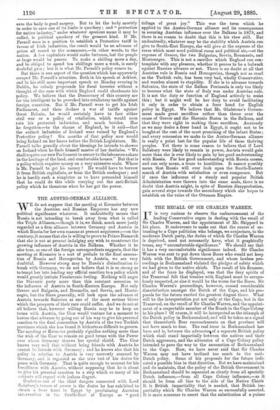THE AUSTRO-GERMAN ALLIANCE.
WE do not suppose that the meeting at Kremsier between the Austrian and Russian Emperors has any new political significance whatever. It undoubtedly means that Russia is not intending to break away from what is called the Triple Alliance,—though it is, we think, much more justly regarded as a firm alliance between Germany and Austria in which Russia for her own reasons at present acquiesces ;—on the contrary,it means that she is willing to prove to Prince Bismarck that she is not at present indulging any wish to counteract the growing influence of Austria in the Balkans. Whether it be also true, as one of the foreign correspondents suggests, that the meeting at Kremsier is a sort of prelude to the final annexa- tion of Bosnia and Herzegovina by Austria, we are very doubtful. However strong may be Russia's disinclination to break with Germany, we do not believe that it is so strong as to tempt her into lending any official sanction to a policy which would greatly irritate Panslavonic feeling. Nothing will anger the Slavonic party more than this constant accession to the influence of Austria in South-Eastern Europe. Not only Greece and Bulgaria, and Roumelia, and Servia, and Monte- negro, but the Slays generally, will look upon the advance of Austria towards Salonica as one of the most serious blows which the prospects of their race could suffer. And we do not at all believe that, however willing Russia may be to keep on terms with Austria, the Czar would venture for a moment to hasten that advance by going out of his way to give his personal sanction to the final annexation by Austria of the two Turkish provinces which she has found it hitherto so difficult to govern. The meeting at Kremsier probably signifies nothing more than the wish of the Czar to remain on good terms with the Power over whom Germany throws her special shield. The Czar knows very well that without being friends with Austria he cannot be friends with Germany ; and he knows also that his policy in relation to Austria is very narrowly scanned by Germany, and is regarded as the true test of his desire for peace with Germany. That is quite enough to account for his frendliness with Austria, without supposing that he is about to give his personal sanction to a step which so many of his subjects will regard with jealous disgust.
Doubtless one of the chief dangers connected with Lord Salisbury's tenure of power is the desire he has exhibited to obtain a freer hand in Egypt by proclaiming Austrian intervention in the South-East of Europe as " good tidings of great joy." This was the term which he applied to the Austro-German alliance and its consequences in securing Austrian influence over the Balkans in 1879, and there is no reason to doubt that this is his view still. Bat undoubtedly, whatever may be the stability which Austria can give to South-East Europe, she will give at the expense of the races which most need political room and political air,—at the expense of Greece, the two Bulgarias, Servia, Roumania, and Montenegro. This is not a sacrifice which England can con- template with any pleasure, whether it proves to be a bulwark against Russian advance or not. There is no doubt at all that Austrian rule in Bosnia and Herzegovina, though not as cruel as the Turkish rule, has been very bad, wholly Conservative, and wooden almost to stupidity. If she is to advance towards Salonica, the state of the Balkan Peninsula is only too likely to become what the state of Italy was under Austrian rule. It is not the duty or function of England actively to resist this ; but it might well be her duty to avoid facilitating it only in order to obtain a freer hand for English policy in Egypt. We believe that Mr. Gladstone's Govern- ment made great sacrifices rather than throw over the cause of Greece and the Slavonic States in the Balkans, and that they were right in making these sacrifices. Anxiously as we may desire a freer hand in Egypt, it ought not to be bought at the cost of the most promising of the infant States ; and every concession we make to the Austro-German alliance is really a point lost for the popular life of these thriving peoples. Yet there is some reason to believe that if Lord Salisbury were likely to remain in power, Austria would gain more than she is ever likely to gain by her good understanding with Russia. For her good understanding with Russia means, and can only mean, a truce to hostilities. It cannot possibly mean that Russia will ever look upon the South-Eastern march of Austria with satisfaction or even composure. But if once the influence of a steady and popular British Administration were thrown into the same scale, there is no doubt that Austria might, in spite of Russian disapprobation, gain several steps towards the ascendancy which she hopes to establish on the ruins of the Ottoman Empire.


































 Previous page
Previous page